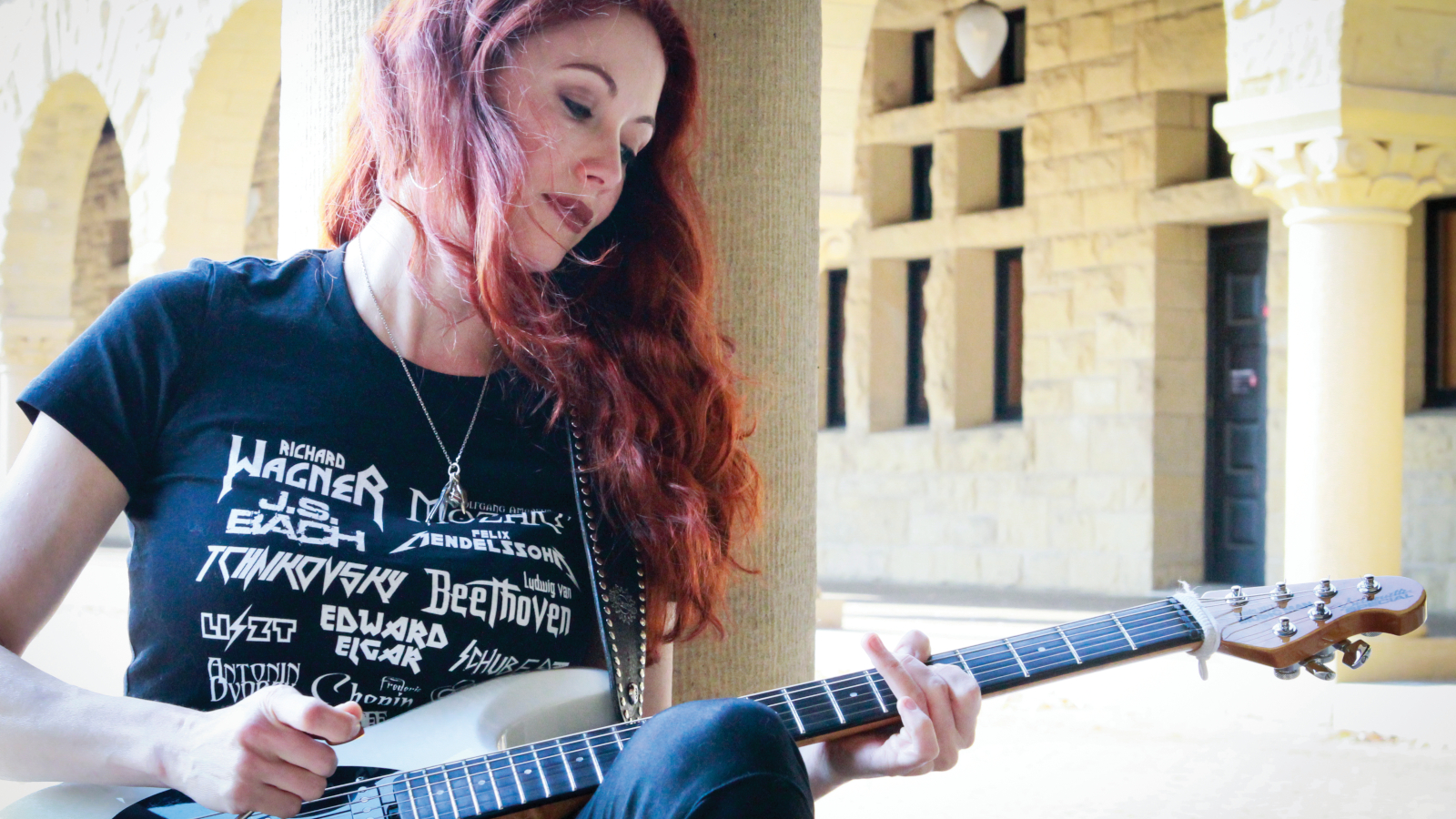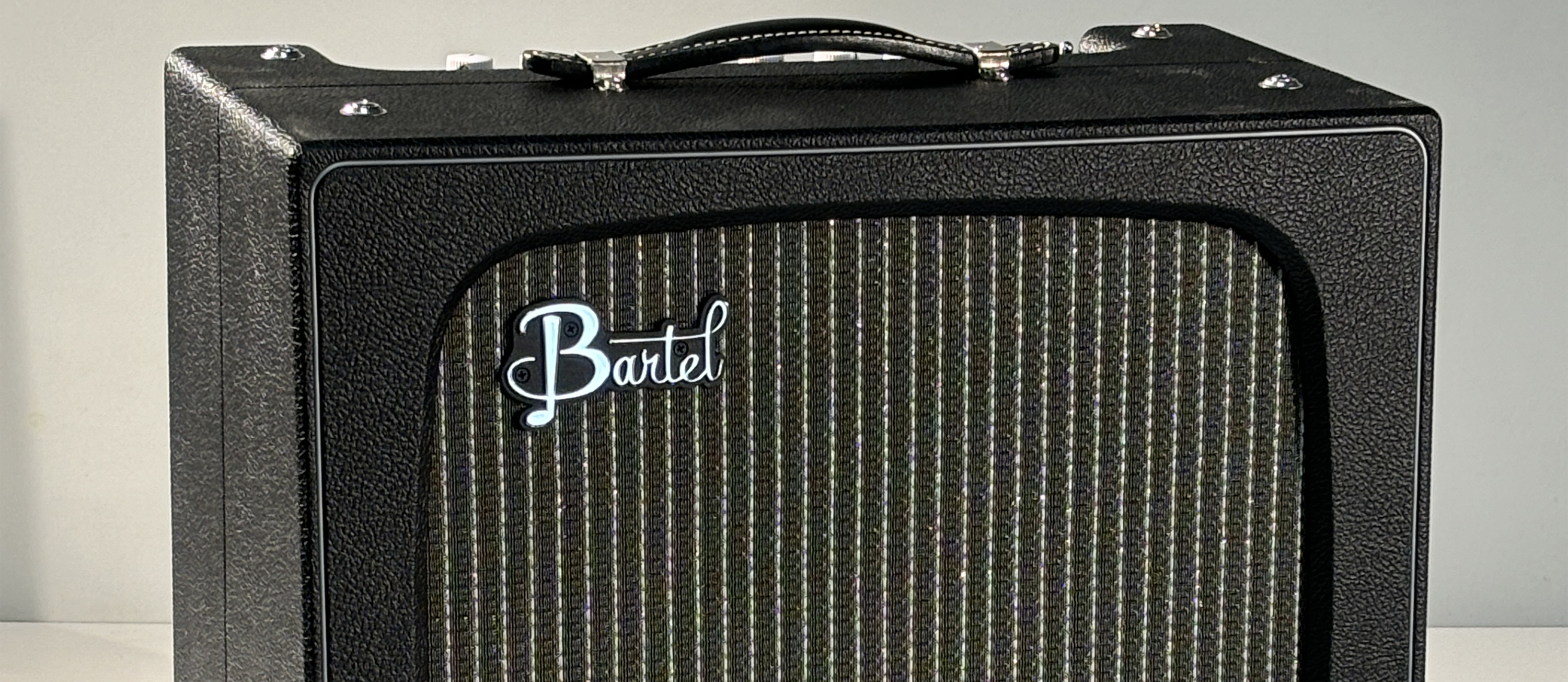
All the latest guitar news, interviews, lessons, reviews, deals and more, direct to your inbox!
You are now subscribed
Your newsletter sign-up was successful
Zepparella guitarist and solo star Gretchen Menn is happy to offer her tips to fellow guitar players. But she’s quick to add that she doesn’t consider herself any kind of six-string authority.
“I’m in the same boat as everybody else who plays guitar,” she says. “I’m still learning something new about the instrument every day.” She pauses, then adds, “That’s the point, really – I’m trying to learn something new. I never want to assume that I’ve got it all down.”
I’m still learning something new about the instrument every day
Gretchen Menn
For Menn, the art of playing and studying guitar is a journey fraught with conflicting emotions.
“It’s thrilling, fun, aggravating and humbling – everything rolled into one,” she says. “But I keep at it. Some days the progress is fast; other days it feels like a grind. That’s when I have to tell myself, Hey, at least I’m learning!
“I would rather spend time trying to uncover areas of weakness than simply bask in what I already know.”
Menn certainly knows a thing or two about a thing or two when it comes to the guitar, and she offers the following sage advice…
1. Protect Your Love of Music
“Even if your goal is to make money as a musician, it’s important that playing music shouldn’t feel like a job. I tried not to put the pressure of finances on my love of music. I remember when I had student debts to pay off; I didn’t want to take on a musical gig I didn’t like just to relieve myself of that burden, because I would feel a kind of resentment.
All the latest guitar news, interviews, lessons, reviews, deals and more, direct to your inbox!
“Music should be a passion, always. You never want to get into a mindset where you don’t want to pick up the guitar. Playing the guitar should always be that thing you look forward to. It’s your refuge from everything else.”
2. Always Be a Student
“It’s easy to get in a rut and think that you’re going nowhere. The way out of that is to constantly challenge yourself. One way you can do that is by listening to music that’s different from what you already know and like.
Stay curious
Gretchen Menn
“For instance, a lot of rock musicians know that they’re ‘supposed’ to like jazz, but for whatever reason they just can’t get into it. But if you keep exposing yourself to it, you’re going to find something about it that you do like. It’ll be a song or an artist, and you’ll go, ‘Okay, now I get it!’
“For me, Django Reinhardt was my entry point, and he led me to Charlie Parker. That’s how it works. So stay curious. Don’t shut yourself off.”
3. Don’t Be Afraid of Basic Terminology and Theory
“You’re going to conceptualize what you’re doing in some way, so why not have it be in a way that allows you to communicate it most efficiently to other musicians? I’m not saying you have to read Arnold Schoenberg’s Theory of Harmony, but simply knowing the notes on your guitar is important.
“What are the sharps and flats? What’s a major scale and what’s a minor? These are things you can learn very quickly, and I don’t know a single literate musician who thinks it’s a waste of time.”
4. Develop Your Ear
“This means understanding what you hear and applying it to your instrument.
You can’t write feel. But if you train your ear to pick up on what a player is doing, you’ll be able to play it yourself – and feel it
Gretchen Menn
"These days it’s so easy to see videos online and learn how to play something. But do you really understand it? Are your ears trained to pick up on all the different aspects of playing?
“I’m talking about groove, articulation, tone, bends, vibrato. And feel. Even with some of the most accurate visual transcriptions, a player’s feel isn’t always conveyed fully.
"You can’t write feel. But if you train your ear to pick up on what a player is doing, you’ll be able to play it yourself – and feel it.”
5. Enlist Teachers and Mentors Who Can Identify Your Weaknesses
“I listen to things I recorded five years ago that sounded great to me at the time. Now I hear them and I go, ‘Oh god, I’m rushing. I sound really off.’ If only I had somebody who could have helped me fix those problems then.
“What you can do is work with teachers and mentors who can identify what you’re doing wrong. It’s like you’re getting a second opinion from somebody, and you can fix the problem right away. Otherwise, it might take you years to detect your weaknesses on your own.”
6. Align Your Practice With Your Goals
“Years ago, I practiced sight reading for an hour a day, and a very wise person asked me, ‘Are you planning on becoming a studio guitarist?’
People have a checklist of things they want to master, but they haven’t figured out what they actually need
Gretchen Menn
I said, ‘No, actually, I’m not.’ It was a revelation – why was I working on something that didn’t really apply to what I wanted?
“I think people have a checklist of things they want to master, but they haven’t figured out what they actually need. The list of things we could work on is massive, and the reality is that you’re only going to be able to focus on a small part of it.
“Focus on what you really want to accomplish and leave the rest behind.”
7. Learn From Your Heroes
“Of course you want to learn all the riffs and solos of people you admire, but there are also nonmusical things you should pay attention to.
Some of your favorite players might be cautionary tales
Gretchen Menn
"Some of your favorite players might be cautionary tales. Maybe they burned out from drugs and alcohol, or maybe they don’t conduct themselves well onstage.
“I saw one of my heroes have a hissy fit onstage because he didn’t like something. I thought that was pretty uncool, and I said to myself, No matter what, I’m going to conduct myself professionally onstage.”
8. Write Music
“Even if you don’t want to be a songwriter, writing music is one of the best ways to learn how to internalize musical concepts.
"Instead of just trying to tap like Eddie Van Halen, go write your own song that incorporates the tapping. It’ll help you grow in so many ways.
“Things will come out of that endeavor that you won’t believe. And you might even have a great song.”

9. Learn How to Improvise
“It’s a lifelong process, and I’m still learning. To me, it’s like speaking. I might not say everything perfectly, but I don’t need to plan every sentence to make my point.
The more I play spontaneously, the better I am at letting the music flow
Gretchen Menn
“Improvising is the same way in that I don’t try to think note per note, but the more I play spontaneously, the better I am at letting the music flow. Yeah, there will be some bad notes and trains of thought, but there will be a lot of good stuff.
“Also, different genres of music are like different dialects, so you’ll uncover new ways of speaking musically if you dive into improvisation.”
10. Keep Your Ego in Check
“To me, insecurity is the other side of the coin of an inflated ego; it’s a preoccupation with yourself.
"I’m more inclined to walk off a stage and feel like a total imposter than I am to think I’m awesome. A healthy ego means you can say, ‘Okay, I’ve made mistakes. I’m a work in progress.’
“Make it a point to always remember what you can’t do, but also feel good about what you’re doing right. It’ll all balance out.”
Visit the Gretchen Menn website here.
Visit the Zepparella website here.

Joe is a freelance journalist who has, over the past few decades, interviewed hundreds of guitarists for Guitar World, Guitar Player, MusicRadar and Classic Rock. He is also a former editor of Guitar World, contributing writer for Guitar Aficionado and VP of A&R for Island Records. He’s an enthusiastic guitarist, but he’s nowhere near the likes of the people he interviews. Surprisingly, his skills are more suited to the drums. If you need a drummer for your Beatles tribute band, look him up.
